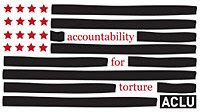When we played our charadeDespite the best intentions of a number of politicians and human rights advocates, the Senate Intelligence Authorization Bill (H.R. 2082) is not going to significantly change the U.S. torture picture. I would note that Human Rights First disagrees with me, as they are actively campaigning for its passage. I believe the leadership of Physicians for Human Rights, and a lot of other people I respect are urging its passage, against threats of a Bush veto. And now, they have gotten their wish, or some kind of start towards its fulfillment in a familiar version of the old style two-stage reformism -- first we stop the CIA's "enhanced" interrogation techniques, then we go after their whole torture apparatus.
We were like children posing
Playing at games, acting out names
Guessing the parts we played
(with a nod to Harry Connick, Jr.)
Who am I to say I know more than HRF or PHR, who both have done such exemplary work in this realm? Today, their strategy began to unfold for real:
The US Senate passed legislation Wednesday requiring US intelligence agencies to use the same interrogation rules as the military, amid an uproar of the CIA's past use of waterboarding.My differences with HRF and PHR boil down to this: I believe that it sows illusions in the reformability of the U.S. torture apparatus, and disarms Americans from the struggle against torture to propagandize the supposed reasonableness of the Army Field Manual reforms. In fact, the reconstructed AFM maintained a core of coercive interrogation techniques that are central to the CIA-created KUBARK form of torture that relies on the induction of Debility, Dread and Dependency in prisoners, mainly through the use of isolation, sensory deprivation, and the inculcation of weakness and fear. The AFM keeps all three. It lies about banning sensory deprivation, but anyone who reads Appendix M of the AFM will see it all laid out for them: use of goggles and earmuffs for sensory deprivation purposes, restriction of sleep to four hours nightly max for 30 or more days, allowance of "fear up harsh," and isolation for 30 days or more. "Or more" means "as authorized."
The White House has warned that President George W. Bush would veto the legislation, which passed the House of Representatives in December and the Senate approved in a 51-45 vote.
Readers are referred to my recent article on this subject, The Wages of Fear: What the Waterboarding Debate is Really About.
In any case, the Senate vote is hardly veto-proof, and I'm afraid Bush and the CIA will have the waterboarding threat to hang over its victims' heads for some time to come. Assuming a likely veto, and an inability to override, the liberal strategy has produced a lose-lose situation. Torture opponents look weak. Their program will not end torture. And even if their bill miraculously passes both houses of Congress and the president's sure veto is overridden, it will not produce further movement for greater action against coercive interrogations. In fact, a supposed waterboard ban will shut it down, as the populace will believe (falsely) the campaign is already won.
We should be demanding a full dismantling of the U.S. torture program -- including the policy of extraordinary rendition and the institution of secret prisons -- and intransigent political opposition to any politician who refuses to sign on.









No comments:
Post a Comment